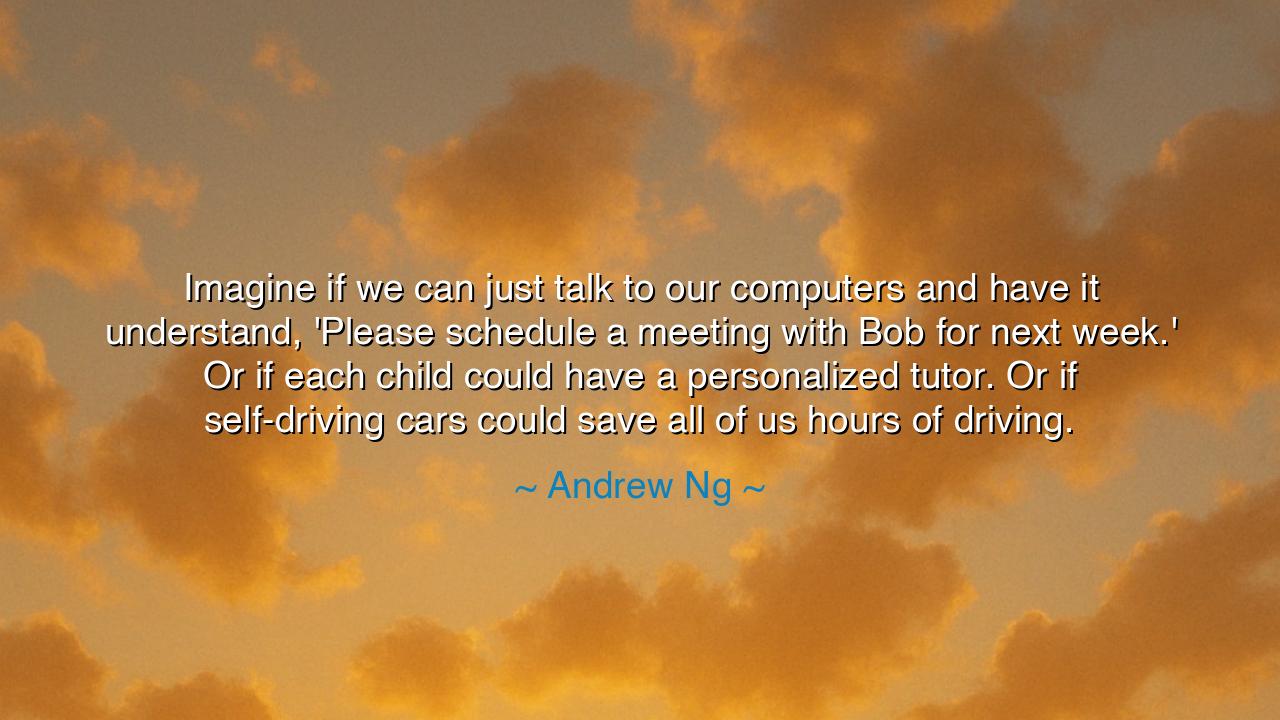
Imagine if we can just talk to our computers and have it
Imagine if we can just talk to our computers and have it understand, 'Please schedule a meeting with Bob for next week.' Or if each child could have a personalized tutor. Or if self-driving cars could save all of us hours of driving.






The words of Andrew Ng — “Imagine if we can just talk to our computers and have it understand, ‘Please schedule a meeting with Bob for next week.’ Or if each child could have a personalized tutor. Or if self-driving cars could save all of us hours of driving.” — are not simply the musings of a scientist; they are a vision of the future made human. In these words lies both wonder and prophecy — a call to imagine a world where technology serves humanity, not commands it. Beneath the surface of practicality — scheduling, tutoring, driving — lies a far deeper truth: that the tools we create reflect the kind of world we choose to build, and the kind of people we choose to become.
In the ancient days, humanity dreamed of fire and flight, of taming the forces of nature that once terrified them. Prometheus stole fire from the gods so that mortals might create and progress; Daedalus built wings so man could touch the heavens. Now, in our own age, the fire of the mind has replaced the fire of the torch — and the invention of artificial intelligence stands as one of the greatest flames ever kindled by human hands. Andrew Ng, one of the modern architects of this revolution, speaks as both builder and dreamer, envisioning machines not as cold instruments, but as extensions of our compassion and curiosity.
The origin of his reflection lies in his life’s work — the pursuit of artificial intelligence as a force for human betterment. As a teacher, researcher, and innovator, he has long sought to make AI accessible and beneficial to all, not merely the powerful few. His examples — a computer that understands speech, a tutor that teaches every child individually, a car that drives itself — are not fantasies, but acts of faith in the potential of science guided by empathy. Through them, he reveals his belief that when machines learn to understand us, they should not replace us, but amplify our humanity.
In his vision we hear echoes of another era — the Industrial Revolution, when steam and steel transformed the world. But where that age often chained men to machines, Ng imagines an age that frees men through machines. Just as the loom multiplied the power of the hand and the printing press magnified the voice of the writer, artificial intelligence, rightly used, could magnify the mind and heart of every person. Yet, like all great power, it carries the shadow of temptation — the danger that we might make our creations gods, and ourselves their servants. Thus, his words invite not blind optimism, but mindful innovation — to imagine boldly, yet act wisely.
Consider the story of Alan Turing, the father of modern computing. In the darkest hour of the Second World War, he built a machine that could think faster than any man, deciphering the codes of the enemy and saving countless lives. Yet after victory, society turned against him, unable to accept the difference that had allowed his genius to flourish. Turing’s fate stands as a reminder: every advance in intelligence must be matched by an advance in compassion. For what use is a brilliant machine if the hearts of those who wield it remain narrow? Ng’s dream of computers that serve, educate, and liberate can only flourish in a world that honors the dignity of those who use them.
The wisdom of Andrew Ng’s vision lies not merely in his foresight, but in his restraint. He does not seek to conquer nature, but to collaborate with it — to build tools that lighten the burdens of labor, that give time back to families, that bring learning to the poorest child. It is a reminder that the purpose of progress is not speed, but service; not luxury, but liberation. When a machine understands a human command, it is not a triumph of code, but of connection — proof that the bridge between thought and action can be built with empathy as well as logic.
So, my children of this digital age, heed this wisdom: let technology be your servant, not your master. Imagine boldly, create fearlessly, but never forget that every circuit, every algorithm, every spark of innovation must serve the light of human good. Seek not only to make computers understand your words, but to make your hearts understand their consequences. Build machines that listen, not only to commands, but to the needs of the world.
For in the end, as Andrew Ng reminds us, the true power of progress is not found in the machine itself, but in the soul of the maker. The day we can speak to computers and have them understand us will be wondrous — but the day we build them with compassion, humility, and wisdom will be divine. Let this be the legacy of our age: that we forged intelligence not to replace our humanity, but to renew it, until the tools we build reflect not our pride, but our hope.






AAdministratorAdministrator
Welcome, honored guests. Please leave a comment, we will respond soon